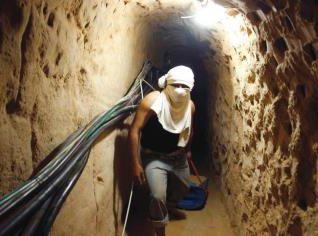Searching, destruction and prevention of digging tunnels from Gaza into Israel
Now it's up to the pumps and water lines to be supplied seawater into the trench in its different locations. Water alone will look for cavities, tunnels, drifts, and the like, and the weakened area to seep into them, carrying with them small and silt fraction. All this will turn previously steady sand into the unsteady quicksand. The experts in subsurface work know how it is simple to overcome the quick sanded or karstic water-saturated soils. It's a different story. But hope before that, it will not come. Hamasuki can only digging by dry. Otherwise, it will not be a mystery.
The costs of operation of the pumping constantly - utter nonsense. And seawater is more than enough. Its amount should be sufficient in the trench so that it should always be as a swamp or pond. This, of course, the result will not come instantaneously, but the water wears away the stone. If you're not to save for sea water, then the slope of groundwater flow in the direction of the sea, will reach the far located underground storages too. If they will not be flooded, then moisturized. Gunpowder dislikes this too. Important, there is no risk to soldiers. Also the territory is not occupied.
Some part of the Israel's side will be also hydrated. But it will be a negligible area. It is because by one and the other sides of the trench there was formed artificially (through the effort of tunnel diggers) two different permeable fields: Israeli, naturally solid, and Gas' - conditionally speaking karstic. Then you can check on the model and in nature. In any case, there is no harm to Israeli farmers.
Side effects
1. Sea water reaches the water table of the aquifer and spoils its quality. Well, don't dig tunnels.
2. Some areas at the Israeli side will be formed ponds. They can be turned into a place of commercial fish breeding and fishing, as well as entertainment of Israelis as a psychological challenge to the enemies.
Professor Isaak Gershanovich
isgersh@yahoo.com

